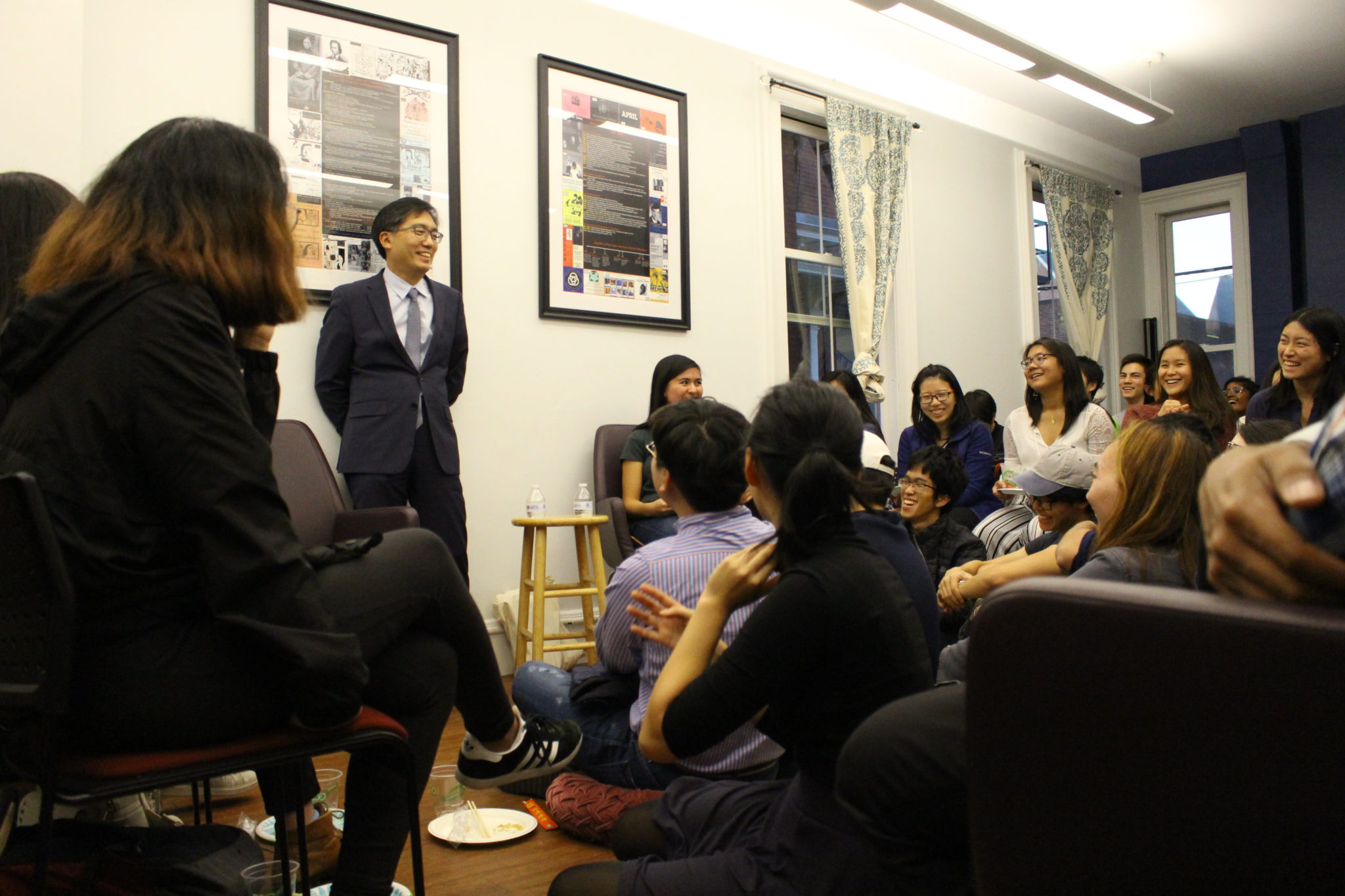
Kitty Kan
Before a crowd of about 60 students, Yale College Dean Marvin Chun, a man accustomed to speaking about University policy, touched on a more personal subject — his family.
“If you ask me to choose which title I like the most, I like ‘Yale parent’ the most,” Chun said, smiling. “If they ask me to give up my deanship, my professorship, my mastership, I would give that all up to be a Yale parent.”
This scene unfolded during a question-and-answer session Friday afternoon at the Asian American Cultural Center, where Chun spoke about his upbringing, Asian-American identity and his experience as dean thus far. During the talk, entitled “Cuisine with the Dean: A Conversa-chun,” Chun answered a broad range of questions, some of them presubmitted, others posed by students in the audience and members of the Asian-American Students Alliance, which organized the event.
Chun said his transition into his new position, which he assumed at the beginning of this academic year, is going “super smoothly” and that support from students and faculty has helped him respond to challenging events, such as President Donald Trump’s repeal of Deferred Action for Childhood Arrivals last month.
“That would’ve been even more difficult than it already [was] if President Salovey had not sent out the message one hour later indicating how Yale would support its students affected by the ruling,” Chun said.
Chun, who was born in San Francisco and grew up in the Bay Area and, later, Memphis, Tennessee, spoke candidly about moving from the U.S. to South Korea as a teenager. He struggled in South Korea’s intense educational system, he said, calling it the “worst place to go to school,” especially since he arrived without any knowledge of the Korean language.
With a laugh, Chun said he “partied all the time” as a college student in Korea, where “every class is pretty much a gut.” Throughout the talk, Chun emphasized that Yalies shouldn’t stress out too much about grades, using himself as an example to show that one bad grade does not destroy a career. He lightheartedly alluded to his opening address earlier this year, when he shared that he had a 2.9 GPA during his first year of college and a C in “Introduction to Psychology” — the class he now teaches at Yale.
However, Chun also said that Korea’s oppressive dictatorship in the 1980s added a “sobering quality” to his college years. The student activism he witnessed during that time of his life now helps him relate to Yale students who are involved in political activism, he said.
After speaking about his past, Chun fielded questions about his vision for his deanship. Two of his main priorities as dean are strengthening the already strong liberal arts education at Yale and ensuring that the residential college system remains inclusive to all students, he said. Expressing his desire to keep as many students on campus as possible, Chun mentioned mixed-college housing as a potential idea for keeping students in the residential colleges.
“I’ve asked the heads [of college] to think about that, whether it’s even feasible or not,” Chun told the News after the talk.
As a psychologist, Chun added that students’ well-being is another main priority for him, and he emphasized the importance of sleep in promoting mental health.
Chun said he takes into account what he knows about psychology when he interacts with students and makes decisions in his capacity as dean.
“My research informs my deanship every moment, every day, because I think psychology by definition is a field that cares about well-being, happiness, thriving and performance,” he said. “We want students to learn how to be self-reliant, strong, resilient.”
Several students at the event said they enjoyed the opportunity to engage with Chun in a more intimate environment.
Richard Park ’21 said he appreciated the chance to meet University administrators in such an informal setting, an opportunity students don’t often get. Stella Xu ’21 and Lauren Chan ’21, members of the AASA who organized the event, said they were surprised by the number of people who came to the talk, since they had originally expected around 30 attendees.
Lauren Gatta ’21, who lived in France before moving to the U.S., said she appreciated Chun’s ability to relate to students who have also grown up in two different countries.
“He has this other perspective after studying in Korea [and] in the U.S., and I think that probably adds a lot of insight into being a dean and knowing what’s best for students based on their different cultures,” Gatta said.
On Nov. 14, the Asian American Students Alliance will host a talk on Asians in Academia with Pauli Murray College Head of College Tina Lu and Professor Denise Ho.
Alice Park | alice.park@yale.edu







